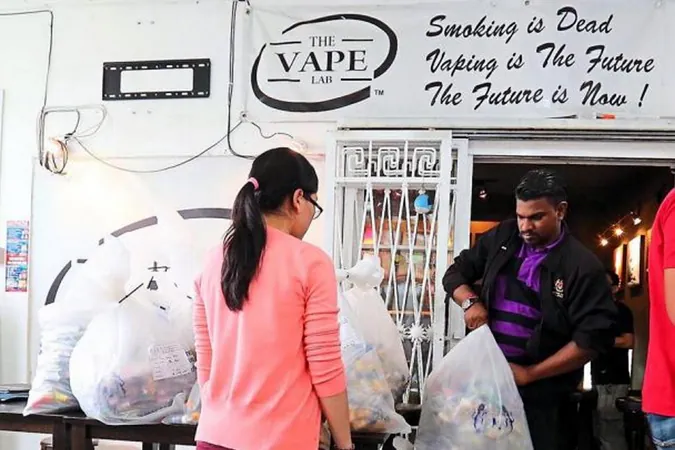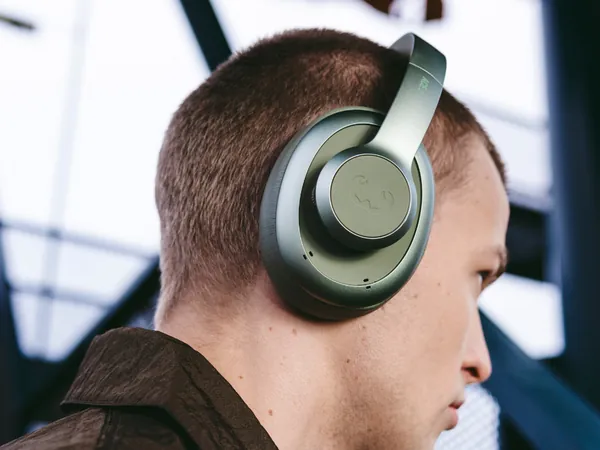
Malaysia's Controversial Move to Ban Vaping Sparks Debate Among Experts and Retailers
2025-09-11
Author: Nur
Malaysia's Vaping Ban: A Bold Step or a Misguided Move?
In a groundbreaking decision, Malaysia is set to follow in the footsteps of its neighbor Singapore by instituting a nationwide ban on vaping. This action aims to tackle the alarming rise in vaping misuse, but opinions are sharply divided. While health advocates applaud the initiative, the pro-vape lobby is gearing up for a fierce fight.
Phased Implementation of the Ban
Health Minister Dzulkefly Ahmad has indicated that the ban will be rolled out in phases, starting with a prohibition on "open-system" vapes—devices that can be refilled manually. This phase will eventually expand to encompass all vape products. Notably, closed-system devices are favored for their convenience, particularly among casual users.
Government's Rationale and Public Health Considerations
During a parliamentary session on September 9 and 10, Dzulkefly confirmed that several state governments—including those of Johor, Kelantan, and Terengganu—are already implementing measures to protect public health. He emphasized a thorough review to create a comprehensive policy aimed at safeguarding the health of the nation.
Vaping Industry on the Rise Amid Proposed Ban
The vaping industry in Malaysia has experienced rapid growth, valued at RM3.48 billion (approximately S$1.1 billion) in 2023—up from RM2.27 billion in 2019. Intriguingly, about 1.4 million adults out of Malaysia's 34.2 million population are now estimated to use e-cigarettes, according to the 2023 Global Adult Tobacco Survey.
Cross-Border Vaping: A Black Market on the Rise?
Despite an ongoing freeze on vape licenses since 2016, Johor's vape market continues to thrive, with many customers reportedly ordering vaping products from Malaysia to Singapore. This underground flow is exacerbated by Singapore's strict ban on vaping, which has led to increased smuggling efforts.
Recent reports indicate that between April and June 2023, authorities in Singapore seized around 90,000 vaping devices in a clampdown on smuggling incidents. The Ministry of Health there reports that over 3,700 individuals were caught possessing vapes in just three months.
Retailers Speak Out Against the Ban
Opposition is loud from groups like the Malaysia Retail Electronic Cigarette Association (MRECA), which warns that a total ban could inadvertently push the trade underground. MRECA President Adzwan Ab Manas argued, "If open-system vapes are banned, it will not solve the misuse problem; consumers may end up using products that contain illicit substances." He advocates for the regulation of approved vape products instead of an outright ban.
Mohamad, a vape shop owner with multiple locations, also expressed confusion over the sudden policy shift. "If the government is serious about health, they should target truly harmful products like alcohol and cigarettes instead," he asserted.
Divergent Opinions Amidst Regulatory Inconsistency
While vaping has been illegal in Singapore since 2018, Malaysia displays a patchwork of regulations that vary from state to state. Additionally, Singapore has recently intensified its anti-vaping measures, treating the issue as a drug-related concern.
Health Advocates Support the Ban
On the other hand, health experts in Malaysia have embraced the impending ban as a necessary measure. Dr. Ng Kim Fong, a prominent cardiologist, voiced the sentiment that preventing health issues before they arise is crucial, advocating for the ban as an essential step.
Lung specialist Dr. Helmy Haja Mydin agreed, asserting that allowing an industry to profit while society bears the consequences is unacceptable.
As Malaysia gears up for this transformative policy change, the debate continues over the future of vaping in the nation and its potential impact on public health and the economy.


 Brasil (PT)
Brasil (PT)
 Canada (EN)
Canada (EN)
 Chile (ES)
Chile (ES)
 Česko (CS)
Česko (CS)
 대한민국 (KO)
대한민국 (KO)
 España (ES)
España (ES)
 France (FR)
France (FR)
 Hong Kong (EN)
Hong Kong (EN)
 Italia (IT)
Italia (IT)
 日本 (JA)
日本 (JA)
 Magyarország (HU)
Magyarország (HU)
 Norge (NO)
Norge (NO)
 Polska (PL)
Polska (PL)
 Schweiz (DE)
Schweiz (DE)
 Singapore (EN)
Singapore (EN)
 Sverige (SV)
Sverige (SV)
 Suomi (FI)
Suomi (FI)
 Türkiye (TR)
Türkiye (TR)
 الإمارات العربية المتحدة (AR)
الإمارات العربية المتحدة (AR)